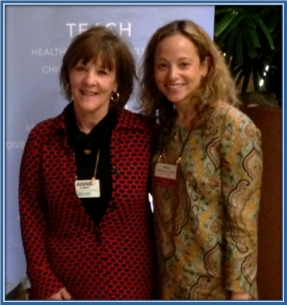
Over the past two-plus years, I have spent time getting to know the Food Marketing Institute team (Anne Curry, Cathy Polley, Liz Garner, and David Fikes). Anne (photographed below), the 2013 recipient of the FMI Woodard Award for Public Affairs, was one of the very first people to join our DC Regional Leadership Boards for Common Threads, and is responsible for laying the foundation for a longstanding relationship between our organizations.
Over the years, FMI has hosted board meetings for us and rallied (in that fun-spirited way) urging friends, grocers, lobbyists to our events to learn about the important work that happens daily in the schools and in the kitchens. What I have observed and appreciate about FMI and their bright, thoughtful team is their belief in the food community to make a difference, their vision for their organization to be a resource, bridge, and partner for all their stakeholders, and their unyielding belief that together they are an army. For all of those reasons and many others, I am elated to announce our partnership in support of their mission and "Let's Put Our Plates Together" initiative to promote and raise awareness for the family meal. We are bringing it back and we are going national!
The other day after yoga I was talking to a woman who is a nurse at the Children's Hospital in Austin. She told me the hospital is replacing the child-sized MRIs, beds, and wheelchairs with the adult-sized versions. It's sickening. This is just part of the $150 billion our nation is estimated to spend on obesity related medical costs this year.
As part of the food community, we have a responsibility to do our part and play a role in combating childhood obesity. The answer is prevention, and promoting the importance of family dinners is a terrific place for our community to lead the war against obesity-related disease. We all love our children and want the best for them. The family meal is a great way to anchor us all and encourage physical, emotional and spiritual well-being. According to a recent Pediatrics publication, children who regularly eat with their family members around the table are 24 percent more likely to eat healthy foods than kids who rarely eat with their families. Adolescents and teens who have close relationships with their parents are also less likely to suffer from obesity, substance abuse, and eating disorders, and to engage in sexual activity. Cooking at home, eating at the table with plates and silverware, and even turning on some music and dimming the lights, as stated in a recent Cornell University study, can help us slow down, linger longer, and enjoy what we are eating and the company we keep. Sounds simple, and it is.
As the chief executive officer of the non-profit Common Threads, I have born witness to significant improvements in our students when they bring their lessons home and help their mothers, fathers, and families with meal time activities. This process is encouraging families to talk and interact while teaching them valuable healthy lifestyles and cooking skills, all while saving money by eating in instead of out. Interestingly enough, 97 percent of parents reported that their child has asked to help with grocery shopping at least once since starting Common Threads, often guiding their families around the perimeter of the store focusing on fresh produce, lean proteins, legumes and whole grains.
We would love for you to consider joining us by encouraging your consumers to pre-buy meals for the week and providing quick, healthy, and affordable meal suggestions. This can easily be done in the form of grocery recipe cards, suggested shopping lists, and in-store demonstrations for eager parents. I believe that food is very much a reflection of our past, present and future: who we were, who we are, and who we want to be. Our relationship with food is personal, familial, and cultural. No one understands this more than the food community, especially grocers as they serve as a larger anchor for the entire community. The grocery store is a great place for consumers to ask questions and can be a launching pad for making healthier choices.
I will admit, I am the rare bird who can spend three hours at the grocery store, dreaming of what I could create then coming to the conclusion that as a working mom, I need to follow through with my weekly meal plan that consists of easy and affordable basics that my husband and children will eat (with a smile, preferably). I appreciate when the fishmonger or butcher gives me a preparation tip or two. I love the healthy, affordable meal ideas and recipes many of your stores provide. Making it easier for consumers encourages them to come back for more, provides a more personalized shopping experience, and creates loyalty that has a lasting effect for families, which can spread community wide.
There is much to do in the fight against childhood obesity. Together we need to take it one plate at a time and to remember to keep doing what we do, what we know best, using wonderful food as the tool to grow healthier happier children into more loving adults.
Tips to take away:
- In-Store Encouragement: Families who eat together teach their children healthy lifestyle skills preventing childhood obesity.

